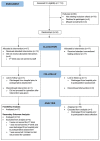A feasibility study on preoperative carbohydrate loading in older patients undergoing hip fracture surgery
- PMID: 38711010
- PMCID: PMC11075227
- DOI: 10.1186/s12877-024-04958-7
A feasibility study on preoperative carbohydrate loading in older patients undergoing hip fracture surgery
Abstract
Background: Preoperative carbohydrate loading in Enhanced Recovery After Surgery is an independent predictor of postoperative outcomes. By reducing the impact of surgical stress response, fasting-induced insulin resistance is modulated. As a clear fluid, consuming carbohydrate drink is safe up to 2 h preoperatively. Widely practiced in abdominal surgeries, its implementation in hip fracture surgeries is yet to be recognized. This study aimed to identify the feasibility of preoperative carbohydrate loading in hip fracture surgery and assess its clinical effects.
Methods: This was a randomized controlled, open labelled trial. Patients ≥ 65 years old without diabetes mellitus, has hip fracture were recruited in a tertiary hospital between November 2020 and May 2021. The intervention was carbohydrate loading versus standard preoperative fasting.
Results: Thirty-four ASA I-III patients (carbohydrate loading and control, n = 17 each), mean age 78 years (SEM ± 1.5), mean body mass index 23.7 (SEM ± 0.6 kg/m2) were recruited. Analysis for feasibility of carbohydrate loading (n = 17) demonstrated attrition rate of 29% (n = 5). Otherwise, all recruited patients were compliant (100% compliance) with no adverse events reported. There was no significant difference among groups in the postoperative nausea and vomiting, pain score, fatigue level, muscle strength, postoperative infection and length of hospital stay assessed at 24-48 h postoperatively.
Conclusion: The implementation of preoperative carbohydrate loading was found to be feasible preoperatively in hip fracture surgeries but requires careful coordination among multidisciplinary teams. An adequately powered randomized controlled study is needed to examine the full benefits of preoperative carbohydrate loading in this group of patients.
Trial registration: This study was registered in ClinicalTrial.gov (ClinicalTrials.gov identifier: NCT04614181, date of registration: 03/11/2020).
Keywords: Carbohydrate loading; Elderly; Hip fracture.
© 2024. The Author(s).
Conflict of interest statement
The authors declare no competing interests.
Figures
References
-
- ANZHFR Bi-National Annual Report for Hip Fracture Care. 2017 [https://anzhfr.org/wp-content/uploads/sites/1164/2021/12/ANZHFR-Annual-R...].
-
- Fawcett J, Ljungqvist W. Starvation, carbohydrate loading, and outcome after major surgery. BJA Educ. 2017;17(9):312–6. doi: 10.1093/bjaed/mkx015. - DOI
Publication types
MeSH terms
Associated data
LinkOut - more resources
Full Text Sources
Medical
Research Materials


